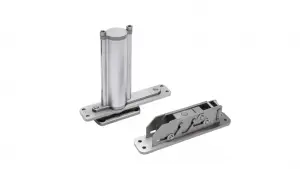Selecting the perfect pivot hinge for your door project might initially appear complicated, but the process is straightforward if you consider a few essential factors. In this article, we will guide you step-by-step to identify the ideal pivot hinge solution tailored specifically to your needs.
Understanding Pivot Hinges
Pivot hinges differ from traditional hinges in their placement and installation. They are installed within the door itself, requiring no alterations to the floor or ceiling. This provides a cleaner aesthetic and facilitates easier installation. Before diving into hinge selection, ensure your door is suitable for a pivot design. Generally, nearly every door, whether interior or exterior, can become a pivot door.
Initial Considerations
When selecting a pivot hinge, several key elements must be considered:
- Door Placement: Decide between side or middle placement for your pivot point. Side placement is ideal for regular doors, providing ample passing space, while middle placement suits pivot walls or large decorative installations.
- Door Functionality: Clarify the functions your door needs to perform. This includes considerations for rotation, hold positions, soft closing, or latch control. Understanding these functionalities early helps narrow your hinge selection.
- Door Dimensions and Weight: Accurate measurements of your door’s width and weight are essential. Pivot hinges vary significantly in their capacity to handle door sizes and weights.
Functionalities to Look For
- Free Rotation: Hinges that offer a 360-degree free rotation without additional functionalities are suitable for pivot walls or minimalist designs.
- Hold Positions: Hinges with hold positions every 90 degrees facilitate convenient open and close actions, beneficial for regular-use doors.
- Damper Control: A hinge with damper control ensures smooth movement, protects against impacts, and prevents accidental slamming.
- Speed and Latch Control: Hinges offering adjustable speed control, especially in the final closing degrees, ensure precise latching even in conditions that might slow the door’s movement, such as draughts or moisture barriers.
Selecting Based on Door Type
Example 1: Large Exterior Door
Consider a robust exterior door measuring 3 meters in height, 1.5 meters in width, weighing around 350 kg. Side placement is preferable here. The optimal hinge should offer comprehensive control—damper, speed, and latch control—ensuring smooth operation and secure closure.
Example 2: Interior Pivoting Wall
Imagine a pivot wall measuring 3 meters high by 4 meters wide, weighing 250 kg. Middle placement would be ideal, supporting free rotation or controlled hold positions. Ensure your selected hinge can handle the wall’s specific dimensions and weight.
Finalizing Your Choice
After identifying your door’s placement, desired functionalities, and exact measurements, you can confidently select the pivot hinge best suited to your project. Remember, the right hinge significantly enhances both the aesthetic and functional performance of your door, providing an elegant and reliable solution tailored specifically to your requirements.
At SMED, we’re experts at choosing the ideal pivot hinge for your project. We offer a variety of custom solutions tailored to your exact requirements—so whatever your needs, we’ve got you covered. If you have any questions or need further assistance, please don’t hesitate to contact us.
